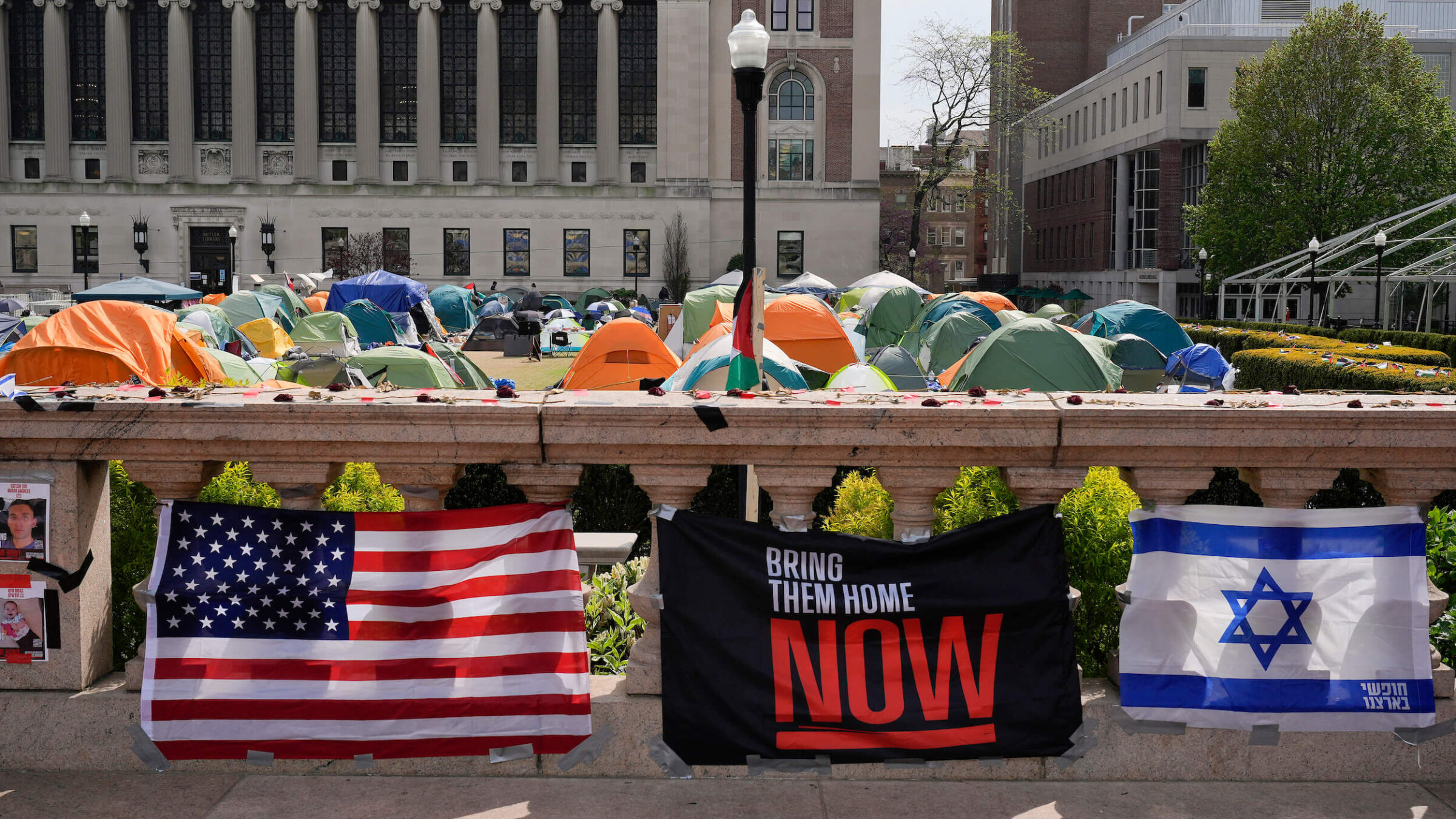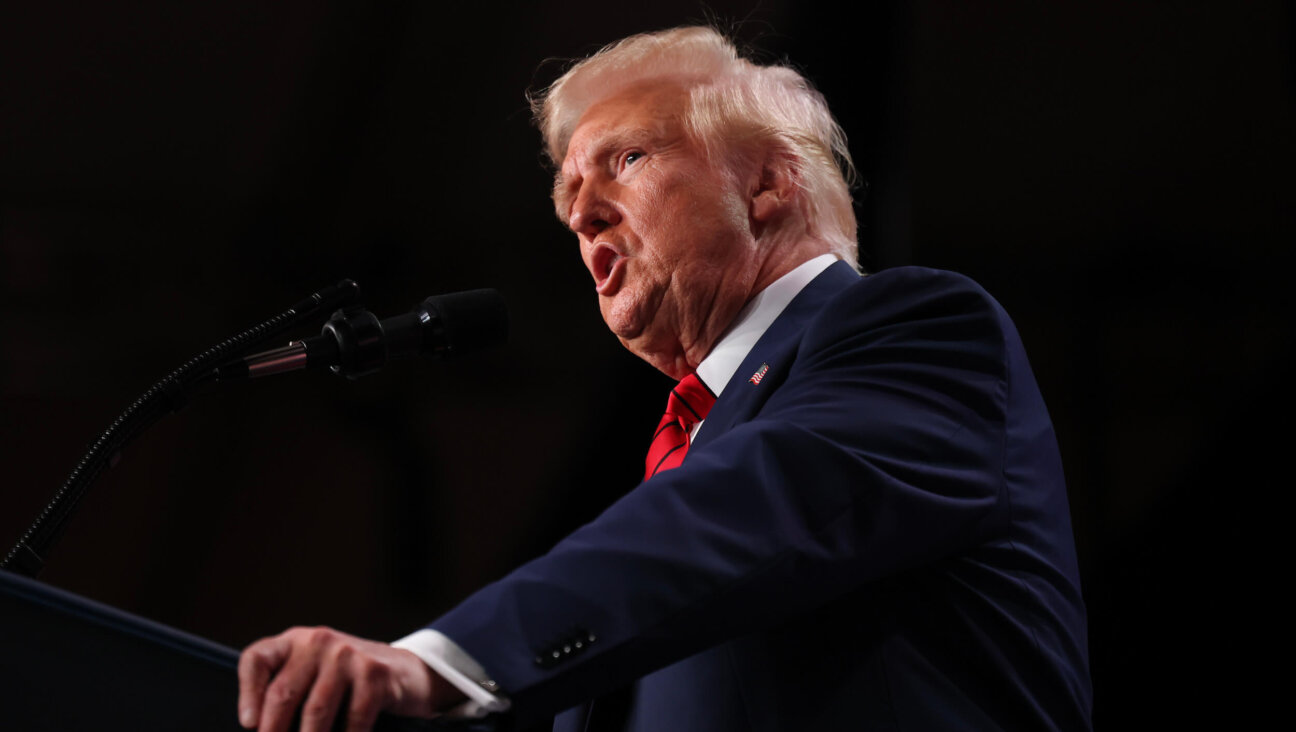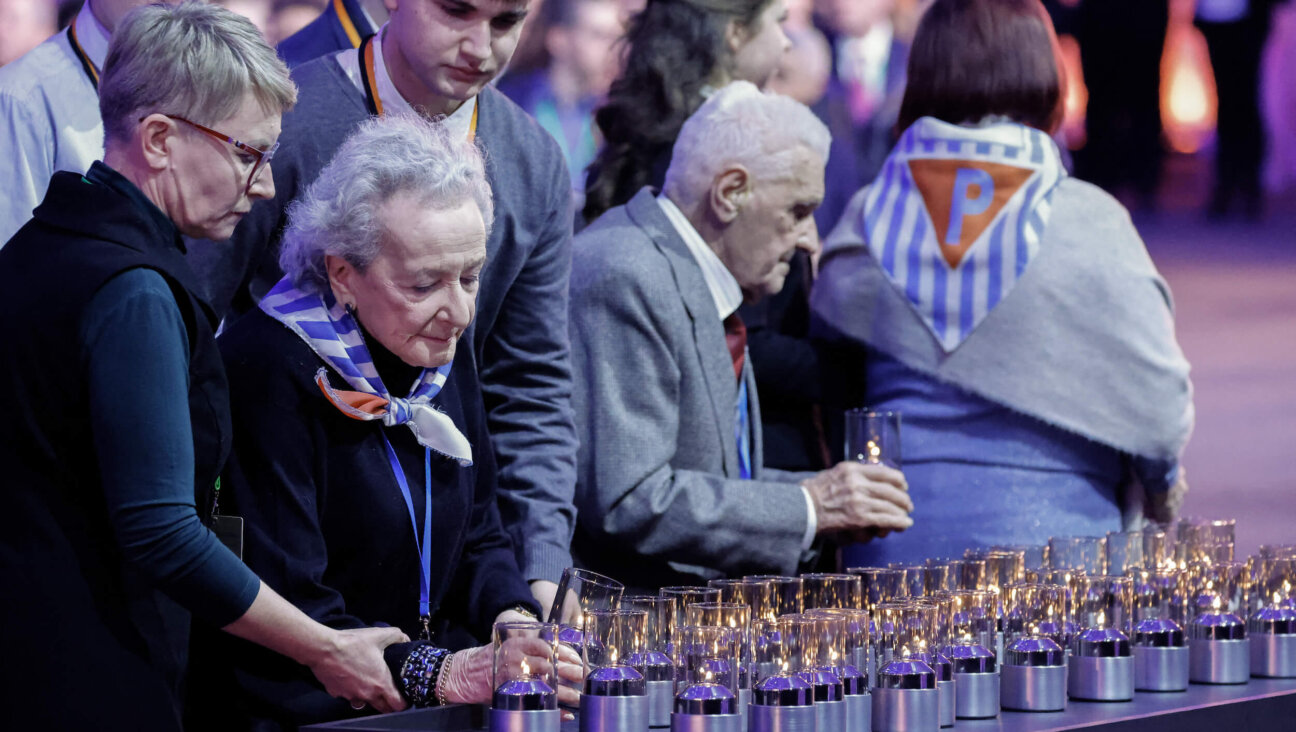I’m a Zionist at Columbia. The protesters at Hamilton Hall were a threat to Jewish students like me
I began my freshman year hopefully. Then pro-Palestinian protesters became increasingly radicalized

An Israeli flag, American flag, and sign reading “Bring them home now” placed next to the encampment of pro-Palestinian student protesters at Columbia University on April 30. Photo by Mary Altaffer / POOL / AFP/Getty Images
Many of my peers at Columbia University, where I am a freshman enrolled in a joint degree program with the Jewish Theological Seminary, have spent the past few days expressing fury over the end of the brief occupation of Hamilton Hall by pro-Palestinian protesters. Police were called in Tuesday night; in a press release, Columbia University Apartheid Divest called their arrest of more than 100 protesters within and outside the building “shocking police violence” that “broke every written and unwritten rule of university norms.”
What they miss: This occupation, for some Jewish students like myself, showcased just how committed our classmates are to not listening to alternative perspectives. If it had been allowed to continue, many of my Jewish classmates would have continued to live in fear knowing that protesters who sought the destruction of Israel had not only hijacked a building in the heart of campus, but also had access to other buildings including freshman dorms and dining halls.
As it is, it will take a long, long time to begin rebuilding trust between visibly Jewish, Zionist students like me, and the rest of the Columbia community.
This occupation — during which protesters used Hamilton Hall to display a giant “Intifada” banner and reportedly held a facilities worker hostage — did not emerge from a vacuum. Instead, it was the culmination of a months-long failure to engage in rational deliberation and meaningful dialogue by my protesting classmates, whose demands included that Columbia divest from Israel and cut ties with Israeli academic institutions.
They repeatedly demonstrated an inability to engage in meaningful discourse with Jewish, pro-Israel voices on campus. They instead embraced, and amplified, a culture in which many students actively avoid dialogue that seeks to understand — and came to see that avoidance as a virtue.
That culture first asserted itself only days after the horrific Hamas terrorist attacks of Oct. 7, when a large pro-Palestinian rally took over the center of campus, before Israel had initiated any military response. Many of my Jewish friends, including myself, felt deeply alarmed by the protest, which failed to condemn Hamas’s terrorism.
A Jewish student went on the record saying they felt “highly disturbed” while a professor explained that they were “afraid” to come to their own campus. Later that same day, many of my friends were forced to shelter in place at the Columbia Hillel after the same demonstrators walked right past it.
The organizers of that protest — including Jewish Voice for Peace — missed the perfect opportunity to engage and empathize with Jewish students in need of support after seeing close to 1,200 people massacred in Israel. By doing so, they initiated a self-righteous cycle whose participants consistently failed to extend empathy and support to many Jewish students in desperate need of it.
In the ensuing months, the repeated use of chants such as “Intifada revolution,” “From the river to the sea,” and “We don’t want no Zionists here” have continued to make me and many other Jews feel alienated on campus, and unwelcome at our own university.
In all of these instances, organizers had the opportunity to directly engage with Jewish students who feel a close connection to Israel, and clarify their intentions behind such chants. Yet without such dialogue, a wider chasm has grown between the two camps.
This disregard for any attempt at reconciliation was perhaps best observed at the University’s so-called “Day of Dialogue” in February, during which lectures by both pro-Palestine and pro-Israel speakers were to be given and discussed in small discussion groups. The program was readily welcomed by several friends and I at the Jewish Theological Seminary, who hoped to see more respect for and interest in our pro-Israel beliefs.
But Columbia University Apartheid Divest — the student group that drove the recent wave of protests at the university — announced a boycott of the event, declaring on their Instagram that, “Students say NO to normalization,” with groups of students chanting and marching directly outside of the room where the symposium was taking place.
These attempts at silencing not just pro-Israel perspectives, but perspectives that acknowledge the nuance of the situation in the Middle East, not only further polarized the Columbia community, but deliberately prevented anyone who sympathized with the pro-Palestine cause from humanizing me and many of my classmates.
Campus organizers didn’t just actively avoid dialogue that, in the words of the University, was meant to foster a “shared commitment to mutual understanding and respect.” They disrupted it, just as they have disrupted speeches by Hillary Clinton, who is pro-Israel, on campus, and just as they attempted to disrupt the testimony of President Minouche Shafik at Congress. Each of these efforts has further radicalized the protest movement.
At some point, I stopped being surprised by seeing stickers that read “Zionists are terrorists,” trucks with signs that read “Israel is the new Nazi Germany,” and demonstration leaders who say “Zionists don’t deserve to live” around campus. Protesters have become drunk off their own rhetoric, and as dialogue with Jewish Zionists has only been further avoided, we have only become further vilified by them.
By shutting out Jewish, pro-Israel voices on campus, too many protesters have been guided down a path of extremism; increasingly threatening forms of rhetoric have become the norm. Their occupation of Hamilton Hall, to me, represents not a proud advocacy for free speech but the seriousness of a rift that has increasingly made me feel unsafe on campus.
A message from our Publisher & CEO Rachel Fishman Feddersen

I hope you appreciated this article. Before you go, I’d like to ask you to please support the Forward’s award-winning, nonprofit journalism so that we can be prepared for whatever news 2025 brings.
At a time when other newsrooms are closing or cutting back, the Forward has removed its paywall and invested additional resources to report on the ground from Israel and around the U.S. on the impact of the war, rising antisemitism and polarized discourse.
Readers like you make it all possible. Support our work by becoming a Forward Member and connect with our journalism and your community.
— Rachel Fishman Feddersen, Publisher and CEO





















